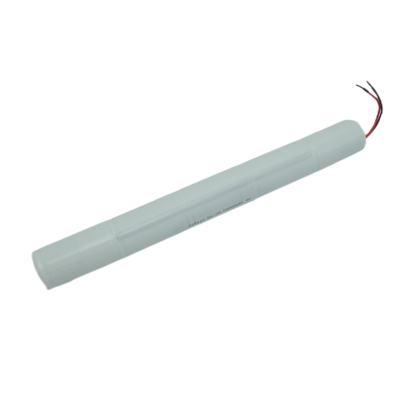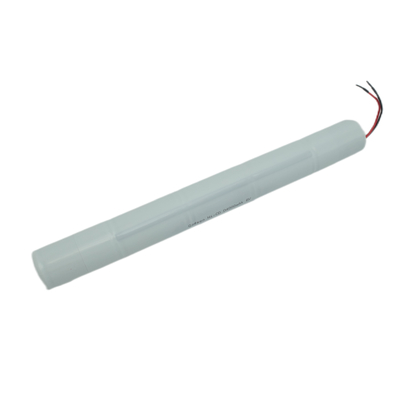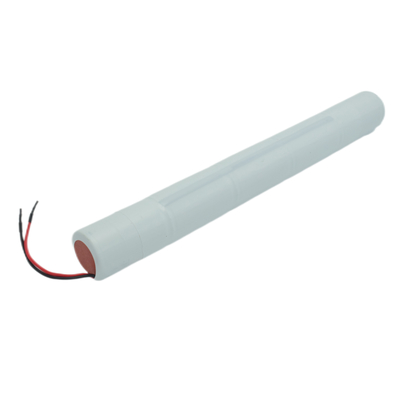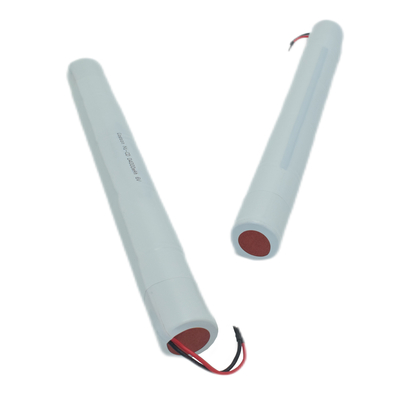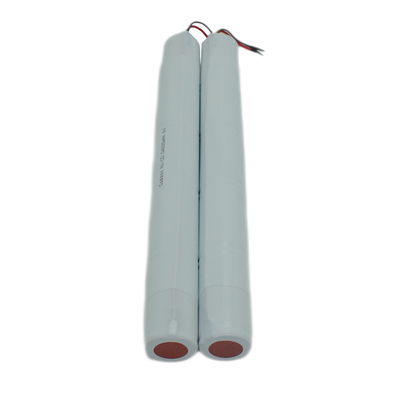6.0 Volt Ni Cd Emergency Exit Light Batteries Stick Type D 4.0Ah
Product parameters:
| Pos. |
Product Paramaters |
Data |
| 1 |
Standard Charge Mode |
0.1C for 16 hours |
| 2 |
Cycle Life |
≥500 times |
| 3 |
Operating Temperature |
(-20℃) - (+70℃) |
| 4 |
Storage Temperature |
(-30℃) - (+60℃) |
| 5 |
Cell Dimension |
33 +0 -1.0(D), 60.0+0 -1.5(H) |
| 6 |
Cell Weight |
≈64g |
| 7 |
Expected Life |
5 years |
| 8 |
Packaging |
Standard export package or customized package |
Composition/Information on Ingredients:
| Chemical Name |
Concentration or concentration ranges (%) |
CAS Number |
| Nickel |
25-27 |
14332-32-2 |
| Cadmium |
26.7-28.7 |
7440-43-9 |
| lron |
22.5-24.5 |
7439-89-6 |
| Sodium |
3-5 |
7440-23-5 |
| Lithium |
1.3-1.5 |
743993-2 |
| Water |
20-22 |
7732-18-5 |
| Cobalt |
1.5-2 |
7440-48-4 |
List Of Ni-CD High Temperature Cells
| Type |
Model |
Diemeter
(mm) |
Height
(mm) |
Capacity
(mAh) |
Voltage
(V) |
Operating Temperature
(°C) |
| D |
GS-D400T |
33.0 +0 -1.0 |
60.0+0 -1.5 |
4000 |
1.2 |
-20 to 70 |
| |
GS-D400 |
33.0 +0 -1.0 |
60.0+0 -1.5 |
4000 |
1.2 |
-20 to 55 |
| |
GS-D450T |
33.0 +0 -1.0 |
60.0+0 -1.5 |
4500 |
1.2 |
-20 to 70 |
| |
GS-D450 |
33.0 +0 -1.0 |
60.0+0 -1.5 |
4500 |
1.2 |
-20 to 55 |
| |
GS-D500T |
33.0 +0 -1.0 |
60.0+0 -1.5 |
5000 |
1.2 |
-20 to 70 |
| |
GS-D500 |
33.0 +0 -1.0 |
60.0+0 -1.5 |
5000 |
1.2 |
-20 to 55 |
| |
GS-1/2D220T |
33.0 +0 -1.0 |
36.0 +0 -1.5 |
2200 |
1.2 |
-20 to 70 |
| |
GS-1/2D220 |
33.0 +0 -1.0 |
36.0 +0 -1.5 |
2200 |
1.2 |
-20 to 55 |
| |
GS-1/2D250 |
33.0 +0 -1.0 |
36.0 +0 -1.5 |
2500 |
1.2 |
-20 to 55 |
NiCd Nickel Cadmium Battery Technology Overview:
NiCd (Nickel Cadmium) batteries are a type of rechargeable battery that uses nickel oxide hydroxide and metallic cadmium as electrodes. These batteries have been around since the early 1900s and have been widely used in a variety of applications due to their high energy density, long cycle life, and reliability. Below is an overview of NiCd battery technology:
1.Chemistry: NiCd batteries use a nickel oxide hydroxide cathode and a cadmium anode. The electrolyte is usually potassium hydroxide.
Advantages: NiCd batteries have a high energy density, which means they can store a lot of energy in a small package. They also have a long cycle life, which means they can be recharged and discharged many times before they need to be replaced. Additionally, NiCd batteries are known for their reliability and can be used in a wide range of temperatures.
2.Applications: NiCd batteries have been used in a wide range of applications, including cordless power tools, emergency lighting, two-way radios, medical equipment, and portable electronics. They are also used in aerospace and aviation applications due to their reliability and resistance to extreme temperatures.
3.Maintenance: To prolong the life of NiCd batteries, it is important to properly charge and discharge them. Overcharging or undercharging can reduce the battery's capacity and shorten its lifespan. NiCd batteries should also be stored in a cool, dry place to prevent degradation.
In conclusion, NiCd battery technology has been around for over a century and has proven to be a reliable and versatile rechargeable battery technology. While they have some disadvantages, they continue to be used in a wide range of applications and industries.
Usage scenarios:
Commercial buildings: Emergency lighting powered by nickel-cadmium batteries is a critical safety feature in commercial buildings such as offices, hotels, and shopping centers.
Hospitals: Emergency lights with nickel-cadmium batteries are essential in hospitals and healthcare facilities to ensure that critical areas remain lit during power outages.
Schools: In educational facilities, emergency lighting systems with nickel-cadmium batteries provide students and staff with a safe exit during emergency situations.
Public spaces: Emergency lighting with nickel-cadmium batteries is also installed in public areas such as airports, train stations, and subways to ensure that people can safely evacuate in the event of an emergency.
In summary, nickel-cadmium batteries for emergency lights are essential components in ensuring safety and security in various commercial, public, and institutional facilities.
Ni-Cd Battery Cell Performance:
1. Ni-Cd Cell Charge Curve At 0.1C For 16h At 55 Degree

2. Ni-Cd Cell Discharge Curve At 0.25C At 55 Degree

3. Ni-Cd Cell Charge Efficiency At Different Temperature

4. Ni-Cd Cell Capacity Change At Permanent Charge At 55 Degree (0.05C Floating)

5. Ni-Cd Cell Cycle Life Curve

FAQ
Q1: Are you a trading company or manufacturer?
A: We are globally trusted supplier and manufacturer of emergency lighting battery, emergency lighting products, whose batteries range covers Ni-Cd, Ni-MH, LiFePO4,, Lion-polymer and other relevant lithium batteries.
Q2: Can you do OEM?
A: Yes, OEM is acceptable. You can provide the detailed specification requirements to us, our engineers can design the most suitable battery solution for you.
Q3: Is it possible to buy a sample to test?
A: Yes. You can buy a sample to test.
Q4:Where can I get the price?
A: Please Click Contact Now or Request a Quote. We will offer you the best quote in 24 hours after we get
the product specifications such as voltage capacity application etc.

 Your message must be between 20-3,000 characters!
Your message must be between 20-3,000 characters! Please check your E-mail!
Please check your E-mail!  Your message must be between 20-3,000 characters!
Your message must be between 20-3,000 characters! Please check your E-mail!
Please check your E-mail! 


